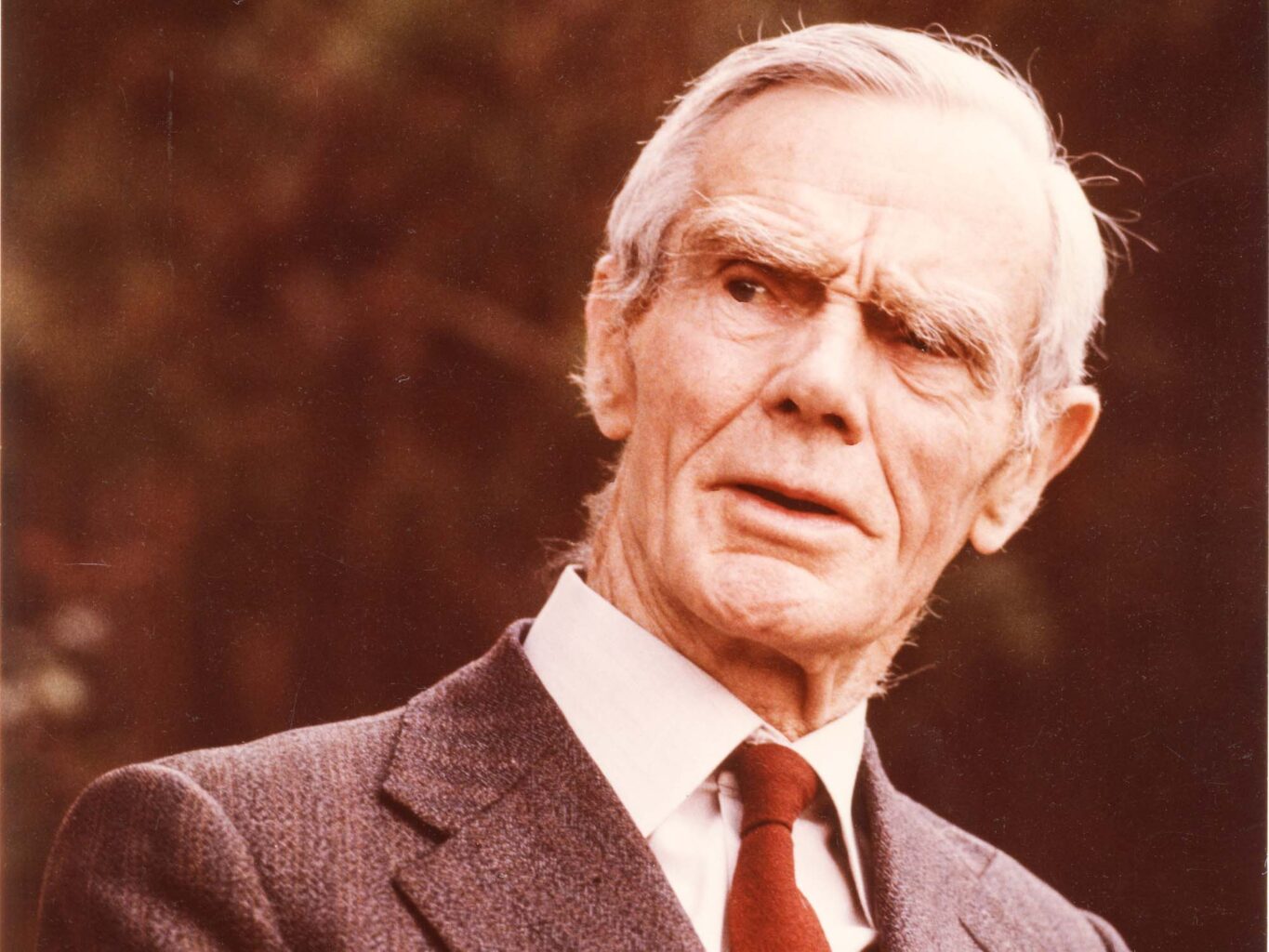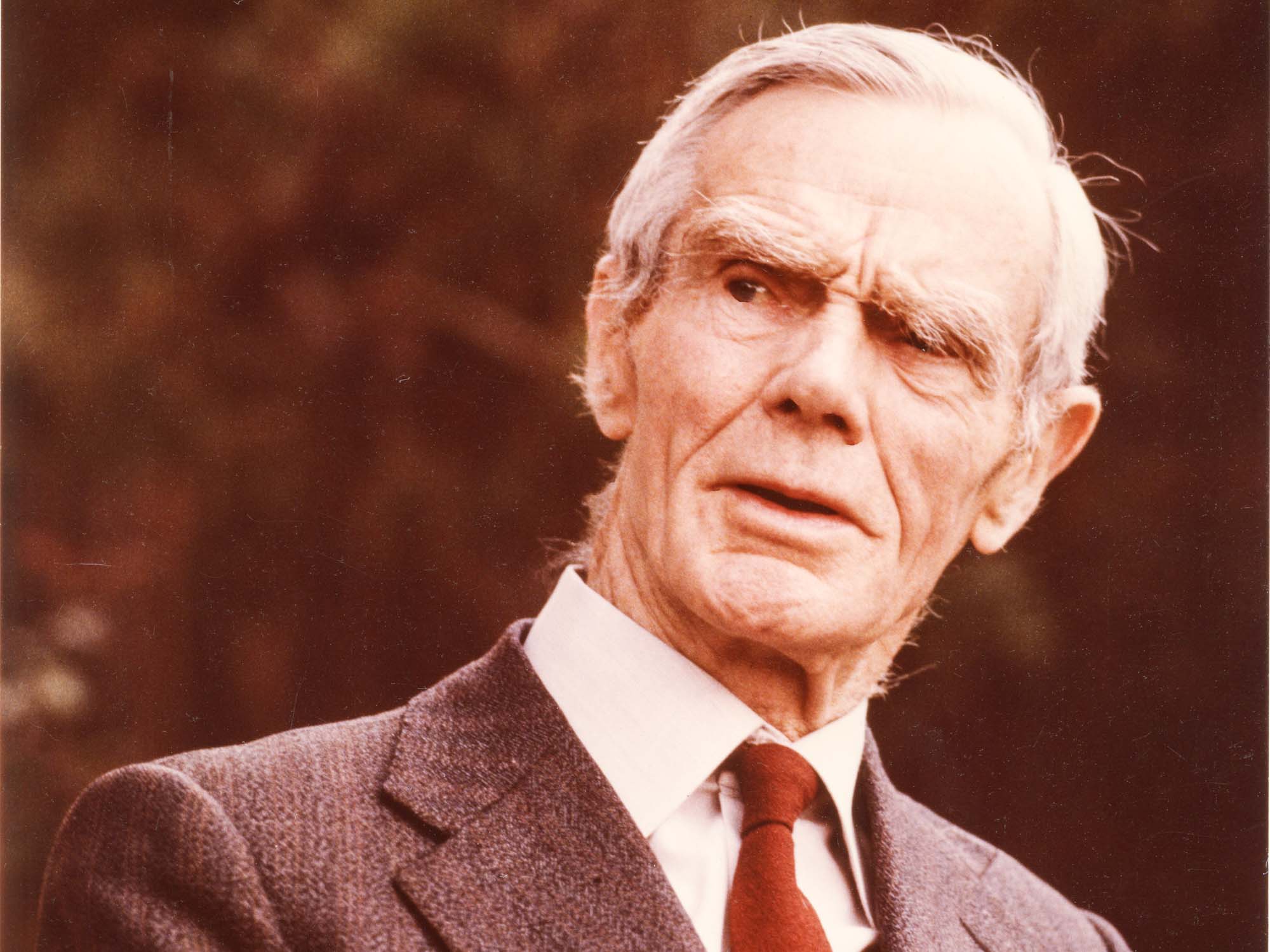Owen Barfield was the first major English translator and interpreter of Steiner – as well as being an incredibly noteworthy literary figure in his own right. Barfield’s story and thought are interwoven with the lives of C.S. Lewis and J.R.R. Tolkien, who were all lifelong friends and intellectual interlocutors, meeting for decades as ‹The Inklings›. This piece by Barfield scholar Max Leyf initiates a continuing exposé.
Perhaps the very crux of Owen Barfield’s thought and work is his theory of the evolution of consciousness. Barfield’s portrayal dovetails with Steiner’s own vision in virtually all essentials, but at the same time – as is so often the case when the same idea is refracted through two different souls and articulated in two different languages – it serves to disclose elements of the theme that Steiner’s work alone may have left tacit or unexplored.
«The evolution of consciousness» is easily said but is perhaps understood only with great difficulty. As a ‹theory›, it is intended to do more than explain what can be readily observed. Instead, the function of a theory is to disclose a phenomenon to begin with. If it were possible to ‹extract› a theory from a phenomenon of perception, the perception of the phenomenon would go along with it. A theory, then, is less an ‹item of knowledge› than a ‹capacity of seeing›. In this case, understanding the evolution of consciousness will provide for perception the inner logic and power that steers the history of ideas: to wit, as fallen leaves may be carried on the current of a brook, so the history of ideas is born along by the evolution of consciousness. Failing to grasp such a theory, an onlooker would be forced, by analogy, to attempt an explanation of the leaves’ movement only in respect to one another and without recourse to what is obviously the primary engine for their locomotion. Any attempt to understand the unfolding of historical events of the past and present will be similarly handicapped without an insight into the evolutionary current in which they are taking part.
The evolution of consciousness, as the term suggests, did not happen at any single instant in time. Instead, the abstract noun ‹evolution› is to be understood in its verbal tense as a present participle; as something ongoing. Barfield differentiates three epochs in the evolution of consciousness for the sake of providing a sort of ‹map› for this metamorphic territory. The first he refers to as «original participation.» The anthropologist Lucien Lévy-Bruhl meant to indicate a similar condition under the rubric «participation mystique». Other thinkers refer to the same as ‹tribal› or ‹primal› consciousness. Original participation denotes a condition of consciousness in which the self has not yet precipitated out of the semantic solution of the world. As salt crystals may condense out of a saline solution, so selves fall out of original participation with all Creation. For this reason, neither ‹spirit› nor ‹matter› exists as a concept because each of their meanings depends on just the phenomenological antithesis with its counterpart that is not a characteristic of the mind immersed in the state of original participation. An originally-participating human being does not say ‹I› to himself. Indeed, he does not juxtapose himself to the world altogether because neither ‹self› nor ‹world› exist as regulative principles of his experience. On the contrary, the originally-participating man recognises the wind that inspires his lungs and animates his limbs to be the same as the one that rustles the birch trees and draws their sap up through their capillaries. Obviously ‹wind› does not strike one of today as the proper term to include these four processes, except in a very figurative sense. Indeed, this very fact that this single term does not compass all of these processes—that our words have been rent from their condition of anterior semantic unity—is a hallmark of our ‹lack› of original participation.
Let us explore this semantic unity and subsequent divergence somewhat further. The following verse from the Gospel of John, King James Version will prove supremely illustrative:
Jesus answered, Verily, verily, I say unto thee, Except a man be born of water and of the Spirit, he cannot enter into the kingdom of God. That which is born of the flesh is flesh; and that which is born of the Spirit is spirit… The wind bloweth where it listeth, and thou hearest the sound thereof, but canst not tell whence it cometh, and whither it goeth: so is every one that is born of the Spirit. (John 3:5-8)
The seventeenth century Jacobin scribes, in order to convey a meaningful passage, were compelled to translate the ‹same› Greek word in three different ways in as many verses! What appears variously as the English words ‹Spirit›, ‹spirit›, and ‹wind› above, and elsewhere in the King James Version — in Genesis 2, for instance—as ‹breath›, are all derived from the same Greek word: πνεύμα (‹pneuma›). If the mind of today wishes to understand its ancient forbear, it must not suppose this can be accomplished without the recognition that words meant something different in ancient times and language itself was experienced in a different manner than that with which we are familiar today.
In the days in which the Gospels were written, ‹pneuma› meant neither ‹spirit›, nor ‹wind›, nor ‹breath›, nor ‹inspiration›, etc… ‹Pneuma› was pregnant with all of these terms, but essentially conveyed something of which our language customs of today offer no adequate comparison except, perhaps, in the form of prepositions like ‹in› and ‹about›. Let the reader reflect on what these terms mean. If the exercise is successful, she will experience an unsettling, and dare one even say, ‹vertiginous› feeling of being unable to fix the word to any material denotation or referent and yet, at the same time, she will be aware of its potent and undeniable significance. Indeed, the meaning of such words is actively ‹present› without permitting itself to be ‹represented› in any single external form. The presence of such words is something we may still participate with our consciousness. Representations, by contrast, appear to confront us with the opaqueness and alterity that is the hallmark of original participation having faded.

Recorded history is the gradual concession of ‹original participation› to ‹onlooker consciousness›. Experience, once a living matrix of presences, becomes an aggregate of representations, abstracted from their fluid and metamorphic semantic matrices. The sunset of original participation begins with the ancient Greek thinkers and the Hebrew prophets, but «the twilight of Minerva’s owl», really descends, as it were, with the Scientific Revolution. Thinkers like Ockham, Copernicus, Bacon, and Galileo were cardinal exponents of onlooker consciousness, though Cartesius sounded the clarion call for this mode of experience. The hallmark of the latter is the division of subject and object, the I juxtaposed against the world as not-I. This structure of consciousness naturally gives rise to the ‹view-from-nowhere› ideal of modern science, which seeks to conceptualise reality exclusively through a grammatical third-person focalization—a focalisation through which everything is an ‹it› and through which everything is conceived in the mode of exteriority lacking any dimension of internal relation or experience.
In ‹Saving the Appearances›, Barfield convincingly argues that the exclusively third-person epistemic of modern science, when extrapolated into a comprehensive theory of reality, is a chimerical notion. It is impossible, Barfierld demonstrates, to refer to ‹the world› or to ‹reality› outside of our experience of it. This is not to be interpreted in a pseudo-solipsistic way because the mind should not be understood as something outside of reality to begin with. In other words, to prescind from inclusion of experience, which is the most self-evident of all dimensions of reality, in our conception of reality is an artificial restriction. It is remarkable that precisely this line of thinking appears to have enjoyed such widespread affirmation over the last centuries (i.e. since Kant or Descartes, or perhaps Ockham). After all, it borders on ‹a priori› incoherence to assert that the mind—whose existence is attested to be the very act of assertion—is not ‹real›
How can this be understood coherently, given that ‹reality› is taken, by definition, to encompass the sum of existing things and the mind is a condition for our perception of them? It is senseless to affirm the existence of colour after rejecting the existence of light.
To say that the world is not separate from experience of it is also not to be interpreted as a doctrinal or axiomatic statement, but as an observation that can be made by anyone who reflects upon his own process of perception. Put another way, Barfield’s argument adduces its support through ‹theoria› and not through ‹theorising›; through vision rather than through speculation. Point-of-view, then, or perspective, is not, as the scientific ideal would suggest, a source of bias that blinds the researcher to reality. Nor is perspective a transcendental threshold that forever estranges him from it, as the critical philosopher in the tradition of Kant might have it. Objective reality is not disjunctive with, or contrary to, perspective. Instead, perspective is the window through which he may perceive what is beyond that window. As J.G. Fichte observed, «We should not desire to see without eyes, but neither should we assert that it is only the eye that sees.» If you want to learn about the world through observation, you cannot at the same time insist that it be observed from nowhere and by no one. Of course, if you do not care about observation, then no observer is necessary. But in that case, it is difficult to see how such a method could meet any of the general criteria of ‹knowledge.› And if it did, then it would have met these criteria by recourse to what is, in essence, the very thing which it had ostensibly rejected.
All knowledge is ‹first-person› knowledge in that it depends on a knower to be known and to be at all. A perfect theory of everything would be useless to someone who could not understand it. Hence, knowledge cannot be coherently conceived in abstraction from the knower who possesses that knowledge and to possess knowledge without understanding that same knowledge is a contradiction in terms. Knowledge without understanding should not be called ‹knowledge› but ‹information› or ‹data›.
Given that when we say ‹reality›, we are not referring to something entirely separate from the activity of our own minds, and given that this is so difficult for modern people to grasp, Barfield is perhaps justified in the following admonition:
We should remember this, when appraising the aberrations of the formally representational arts. Of course, in so far as these are due to affectation, they are of no importance. But in so far as they are genuine, they are genuine because the artist has in some way or other experienced the world he represents. And in so far as they are appreciated, they are appreciated by those who are themselves willing to make a move towards seeing the world in that way, and, ultimately therefore, seeing that kind of world. We should remember this, when we see pictures of a dog with six legs emerging from a vegetable marrow or a woman with a motor-bicycle substituted for her left breast.1

‹Art› is perhaps best understood as an intentional stance of participation than by any specific feature of its product. After all, when cultured critics ensured us that Duchamp’s «Fountain», was not just a porcelain urinal, they were arguing on the basis of something other than its ‹formal› and ‹material› causes. Instead, they were reporting an experience of participation that characterised their perception of the object. This stance of participation describes both the artist and the viewer or audience.
The artist participates the archetype, or formal cause, with his imagination and forthwith sets about to raise his medium to participate it as well. In this way, the original medium is transfigured into a work of art. As a result, it may serve as a sort of invitation to any viewer to participate the same archetype. And this participation shapes us, «Or do you suppose there is any way in which someone can consort [ὁμιλεῖ] with what he admires without becoming like it?»2 This much cannot be denied: art serves to instruct our imaginations and in this connection, the thrust of Barfield’s warning can become clear. Through the experience of art, we rehearse given forms in our perception. As a result, our experience of the world is stamped with a given inflection which the artwork conveys. But our experience is, itself, a part of, and not apart from, the world. Hence, the world is inflected in the same mode as the artistic imaginary. In this way, an understanding of the simultaneous active and receptive processes in the experience of art can disclose the same elements in ordinary perception. The world is not simply lying around waiting to be perceived. Instead, the world calls forth something from our minds and our minds, in turn, actively imbue their response upon the world which we perceive. And this process is, itself, not apart from the world but rather an integral part of it. Once the co-extension of mind and world is grasped, it will be clear that ‹bona fide› art can be both edifying and epiphanic.
But these terms signal the advent of final participation and thus gesture to the future while a more thorough characterisation of humanity’s arrival at the present stage of the evolution of consciousness remains to be undertaken. Indeed, there are important nuances to consider in our attempts to conceive of the transition from original participation to one in which participation is all but absent. For instance, if we wish to situate the historical onset of this so-called «onlooker consciousness», the answer will necessarily vary widely according to the particular peoples that are in question. While a descent into this stage began with Greek philosophy and the stringent monotheism of Israel in the fifth and fourth centuries B.C., it took until the end of the Middle Ages for Europe, especially in its Northern regions, to undergo a similar shift. In other words, the Northern peoples remained in original participation for the better part of two thousand years after the Mediterranean peoples had begun to leave it. Aboriginal tribes arguably have not lost their condition of original participation even today. In the history of Europe, it is as though waves of original participating peoples come lapping against the shore of a civilisation of onlooker consciousness, and the former are slowly dried out on the strands of the latter. One may picture the Visigoths sacking Rome, for instance, and the Viking invasions of Europe. In both instances, a youthful and vigorous folk confronts a civilised and somewhat sclerotic one, and both are fundamentally transformed in the process.
Another important aspect that makes the transition from original participation to onlooker consciousness so interesting is that each of us recapitulates an analogous ‹scleroticization› in our own biographies, as we descend from the dreamy participation of childhood into the dry, prosaic, and utilitarian operations of adulthood. We could say each biography recapitulates the phylogeny of the race. It may become a source of personal inspiration to consider how our individual biographies simultaneously carry forward the story of the human race. A man who undertakes the ‹magnum opus› of the alchemists, symbolically conceived as the task of uniting the Sun and Moon in himself, ‹viz›., of reintegrating the disjunction inherent in onlooker consciousness into a higher union, also accomplishes this work on behalf of humankind. Hence it is written, by John Donne: «no man is an island… send not to know for whom the bell tolls, it tolls for thee.»
Barfield calls this next phase in the evolution of consciousness «final participation.» I have explored this theme under the rubric of Goethean science on other occasions. Goethe was indeed unconsciously pioneering the final participation that is the birthright of us all but the realisation of which depends on the individual efforts of each of us. If the ‹view-from-nowhere› ideal of modern science can index to the grammatical third-person focalization, then Goethe’s way of knowledge integrates the second-person dimension of experience into scientific inquiry. This is to say that Goethe’s way of science incorporates the relationality of beings and phenomena into its scope of consideration. I can regard a phenomenon as an ‹it› by bracketing my own existence out of the encounter and without a doubt, certain observations can be made in this mode of inquiry. And yet the method itself is an abstraction insofar as there could be no encounter to begin with, nor any observations to follow, if I were not in fact present in relation to the phenomenon in question. A scientific method, therefore, that integrates the second-person dimension in its scope of inquiry is less abstract and therefore more fully-ordered to what is real than one which brackets out these relations.
Rudolf Steiner brought to fruition the capacity that germinated in Goethe’s work and progression that the latter initiated by fully incorporating the dimension of first-person experience into the scope of science. The latter implies the This achievement, together with Barfield’s role in it, was the subject of my doctoral dissertation. In short, final participation entails the recapture of participation without the forfeiture of «the pearl of great price» that was forged in the exile of the onlooker condition. This pearl is, of course, the individuated consciousness we experience as the self. In the same way that the final chapter of a story can cast the prior chapters in an entirely new light, so all onlooker consciousness is redeemed in the fruition of final participation. Exile was a grain of sand, but the world was your oyster.














Thanks Max.
https://www.youtube.com/watch?v=yA2NBid5ef0
The René Sans Secret : A Co-creative Faculty